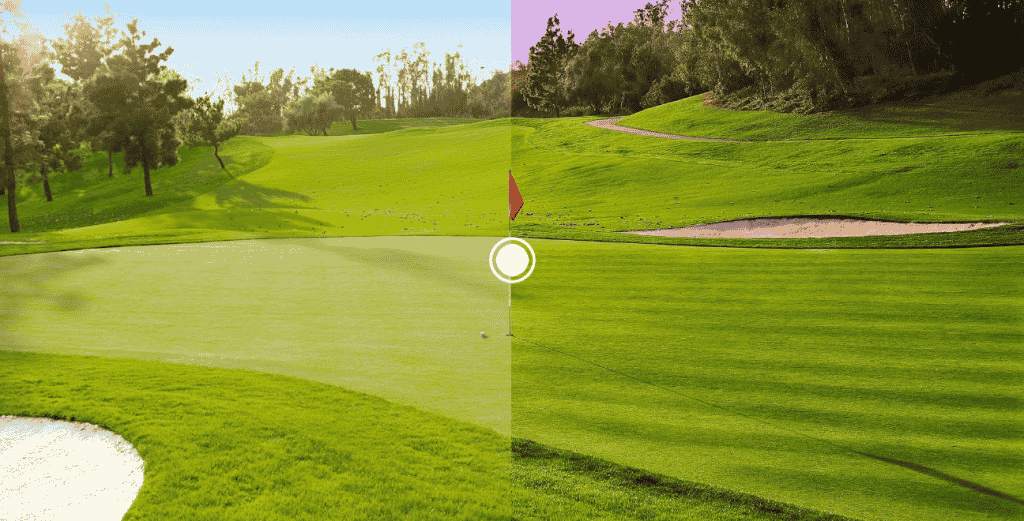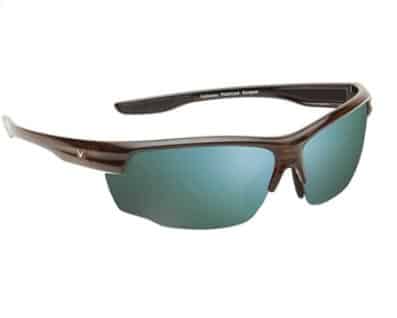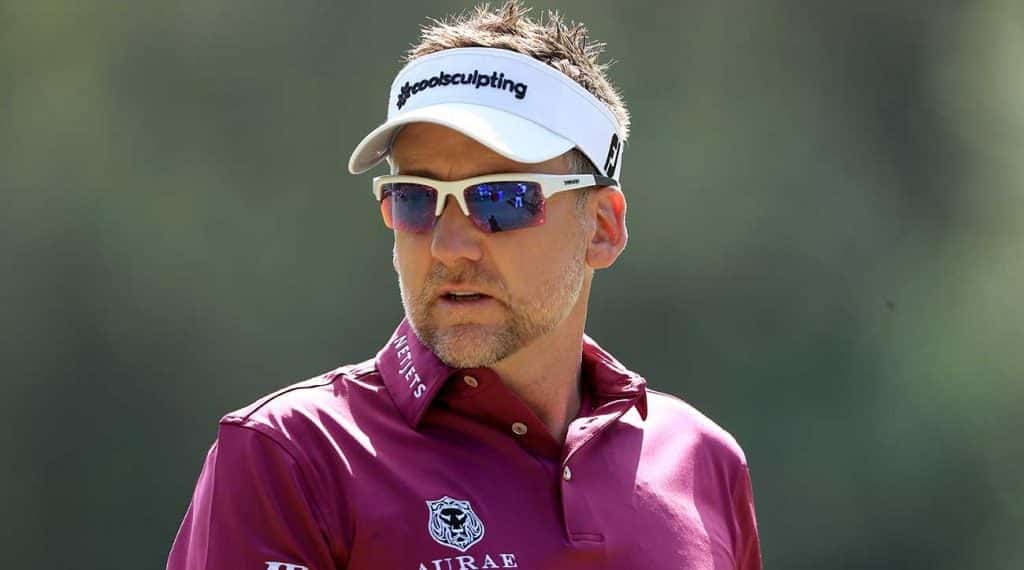Golf is a hard-enough game already without having to battle the glare of the sun, too.
We’ve all had times on the course when we’re hitting into blinding light – and no matter how much we squint, or try to block out the rays of sunlight with our hand or by wearing a visor, sometimes we lose track of the ball as soon as it leaves the clubface.
It can affect the confidence of one’s golf game and, at worst, can even destroy a round if losing track of the ball in flight results in a lost ball.
One of the best, most affordable and most comfortable ways to combat the sun while playing golf is to invest in a pair of sunglasses.
There are plenty of PGA Tour players – such as Ian Poulter, Paul Casey and now Phil Mickelson – who regularly wear sunglasses while on the course, and many won’t play without them.
You have the choice of purchasing sunglasses with or without polarized lenses, and there are distinct differences between the two. The main question this article will answer is: Are polarized sunglasses good for golf?
Polarized sunglasses are excellent for golf because they stop light glare hitting you directly in the eye. This helps when looking into the sun, as you are less likely to lose track of your golf ball in flight after making your swing. However, many players find it difficult to read greens when wearing polarized lenses so it’s usually best to remove them when putting.
So, if you find yourself constantly straining your eyes when on the golf course due to the sun glare off the fairways, surrounding water hazards or even shiny, firm greens, then a purchasing a pair of polarized sunglasses could put you on the path to shooting lower scores.
Below I’ve answered some other common questions relating to polarized sunglasses, including the pros and cons of using them instead of normal lenses, and also provided some reviews about the best polarized sunglasses you can buy online.
Table of contents
What does it mean to have polarized sunglasses?
Polarized sunglasses use a special, filtered lens to block glare from hitting your eye while wearing them. They offer greater protection against potentially dangerous UV rays than standard, non-polarized sunglasses.
After doing a bit of research online, I learned that sunlight scatters in all directions and when it strikes flat surfaces, those sun beams tend to travel in a more horizontal direction – and by doing so creates intense lighting that causes glare and hinders sight.
It can also be extremely uncomfortable for you.
Polarized lenses contain laminated filter that only allows vertical light to pass through while blocking out horizontal light, which in turn almost entirely eliminates glare.
These lenses are available in a variety of different colours, with the darker tints blocking more sunlight out.
Polarized v non polarised sunglasses: What are the differences?
There are distinct advantages and disadvantages of wearing polarized lenses versus normal lenses when playing golf, and I’ve listed them in a few easy to read dot-points below.
Polarized sunglasses
Advantages
- Help reduce glare, meaning it’s easier to see your ball flight when hitting into the sun
- Less likely to lose golf balls because you’ll be able to see them easier
- Less squinting on the course means less distractions and less eye strain, which could lead to lower scores due to increased focus
- Images appear sharper and clearer, increasing clarity and comfort
- Most polarized sunglasses block out ultra-violet light (provided they have UV Protection certification), which can be harmful to your eyes
Disadvantages
- Can sometimes hinder depth perception, which may make it harder for some players to strike the ball consistently
- Hindered depth perception can also potentially make it harder to putt while wearing them
- Potentially cost slightly more than normal lenses
- Some people may find they block out too much sunlight, making them uncomfortable to wear
Non-polarized sunglasses
Advantages
- Typically are a lot cheaper than polarized lenses
- Still block out sun glare without affecting depth perception
- Can be replaced cheaply if they are broken
Disadvantages
- Don’t block out anywhere near as much glare as polarized lenses, meaning you may still find yourself squinting while wearing looking into intense sunlight
- Offer little to no extra protection from harmful ultra-violet light
- Offer less clarity, comfort and focus for the user

So, if you are someone who is sensitive to intense sunlight – and find it uncomfortable being out on the golf course for four hours – I would certainly recommend investing in a pair of polarized sunglasses.
Not only do they protect your eyes from damaging ultra-violet rays (provided they have UV Protection certification), they are also proven to significantly reduce glare and improve overall comfort for the user.
And if there’s one thing that leads to better golf, it is being comfortable. If you’re relaxed and feeling good on the course, you are far more likely to play better.
Will polarized lenses make reading greens easier or harder?
There is no clear evidence to confirm whether polarized sunglasses make it easier or harder to read greens. Some players say they make it easier, while others contest they make it harder. The benefits of polarized lenses when putting is definitely subjective.
Having trawled plenty of golf forums online and watched a number of videos on the topic, the general consensus is: it’s a matter of personal preference.
Some players find that polarized lenses impact their depth perception too much when trying to read greens, and for that reason remove their sunglasses before putting.
Other players, however, say polarized lenses improve their clarity and focus when trying to read the breaks in the green, and therefore will leave their sunglasses on while putting.
Ultimately, it comes down to whatever you feel comfortable with: try reading greens with and without your polarized sunglasses on, and you’ll quickly learn whether it helps or hinders you.

Are polarized sunglasses better for your eyes?
Polarized lenses can offer greater protection for your eyes against ultra-violet rays – but only if they are UV protection certified. This is a big distinction, and you should not confuse polarized lenses for UV-protected lenses.
Using sunglasses that are both UV-protected and polarized give you the greatest chance of shielding your eyes against cataract damage, or other vision impairments, while at the same time reduces the amount of sun glare that penetrate the lenses.
Should you wear sunglasses while playing golf?
Whether you wear sunglasses or not while playing golf comes down to personal preference – there is no right or wrong answer. Some players find they play better when wearing sunglasses, while other players feel they perform better on the course without them.
If you do prefer to play with sunglasses, it’s beneficial to find a pair that fit you well, are comfortable and are effective in keeping out glare – this will give you the best chance possible to play good golf.
Personally, I’ll wear sunglasses while playing golf if it is an extremely sunny day, while I won’t typically wear them if it’s overcast. It’s a matter of adjusting to the conditions.
What are the best polarized sunglasses for playing golf?
Having done some quick research online, these are the 11 best polarized sunglasses you can buy for playing golf (click here to read my full review on each of them) :
- Callaway Kite Sunglasses
- Callaway Raptor Sunglasses
- Oakley Half Jacket 2.0 XL Sunglasses
- Oakley Turbine Sunglasses
- Oakley Radar EV Path Sunglasses
- Oakley Apparition Sunglasses
- Oakley Mainlink Sunglasses
- Oakley Gascan Sunglasses
- Oakley Split Shot Sunglasses
- Under Armour Igniter Sunglasses
- Dragon Men’s The Verse Rectangular Sunglasses

Each pair of sunglasses has its own unique style and color, and each will do a great job of shielding your eyes from sun glare.
I’ve done an in-depth review of each model explaining the differences between them, which I highly recommended you read here before making a purchase.
Ultimately, the ones you choose will be a matter of personal preference, however it’s hard to go past either the Callaway Kite of Callaway Raptor glasses – both are polarized and UV-Protection certified, meaning your eyes will be best protected from ultra-violent light and glare.
But if you’re looking for something more high-end, Oakley remains the gold-standard in sports eyewear and any of those models will do the job just fine – it all comes down to what you’re willing to spend.
- TaylorMade SIM2 Max Driver vs M4 Driver: Worth it in 2024? - April 15, 2024
- 3 Ways to Win the Mental Game with the Bridgestone Mindset Golf Ball - March 29, 2024
- TaylorMade SIM Max & SIM2 Max Drivers: Are they Still Relevant in 2024? - March 9, 2024


